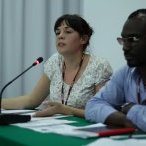
1ro de diciembre de 2010 | Noticias | Justicia climática y energía | COP 16
Deceitful Figures
Numbers in the fight against climate change: central issue at the COP in Cancun
Descargar: MP3 (2 MB)
The proposals around climate finance included in the “Copenhagen Accord” of December, 2009, by the US and some countries is considered completely inadequate by several governments and social movements and organizations in the world.
The Copenhagen “Accord”, which was decided behind closed doors at the COP15 in Copenhagen, Denmark, offers 30 billion dollars between 2010 -2012 in climate finance for developing countries, and then 100 billion dollars annually by 2020. The first number represents 0.005 % of the annual Gross Domestic Product (GDP) of industrialized countries, and the second offer represents 0.05 %. In addition, a high percentage of this finance would come from the carbon market.
Contrary to this, the “Peoples´ Agreement” which came out as a result of the World Peoples´ Conference on Climate Change and the Rights of Mother Earth which took place in April 2010 in Cochabamba, Bolivia, proposes that climate finance should represent 6% of the annual GDP of rich countries.
To analyze this issue, Friends of the Earth International carried out on Tuesday an activity parallel to the COP16 on Climate Change in Cancun, Mexico. There, representatives of the environmentalist federation from El Salvador, Cameroon, the US, South Africa and the UK talked about the issue. Lidy Nacpil, member of Jubilee South, was also invited as panelist.
The activity was “Climate Finance: the Good, the Bad and the Ugly” and over 100 people from different civil society organizations and some governmental representatives were present. Friends of the Earth England, Wales and Northern Ireland took the opportunity to launch a new report with a series of finance proposals alternative to carbon trade.
“Friends of the Earth International demands the establishment of a global climate fund under the authority of the United Nations Framework Convention on Climate Change, with no role for the World Bank", read the invitation to the activity. “All finance for this fund must come from public sources and any role for carbon markets must be rejected”, they added.
FoE US representative, Karen Orenstein, said at the conference that the number of 100 billion dollars proposed in the Copenhagen Accord is arbitrary and that it contrasts with the much higher defense budgets of rich countries. The activist demanded the creation of a global climate fund in Cancun, and regretted the fact that the US is trying to block all efforts towards it.
Lidy Nacpil, member of Jubilee South, highlighted the concept of the “climate debt” of the Northern countries, which according to her is the starting point of the discussion around climate finance. Nacpil said that the industrialized world should provide the necessary “financial redress” to the Global South and radically cut their emissions.
Siziwe Khanyile, member of Friends of the Earth South Africa, talked about the loan the World Bank granted to state energy company Eskom for the building of a coal-powered plant in Lephalale, Limpopo province. The loan amounts to 3.75 billion dollars. According to Khanyile, this new power plant would emit 25 million tons of CO2 per year. The activist highlighted the contradictions between this World Bank loan and its low-carbon economies speech.
Also, Samuel Nnah Ndobe, member of Friends of the Earth Cameroon, focused on the Reducing Emissions from Deforestation and Forest Degradation in Developing Countries (REDD) mechanism. He said that it is a tool that will allow developed countries to continue polluting and carrying out business as usual. In turn, he demanded that the local communities should be in charge of preserving forests.
Finally, Friends of the Earth England, Wales and Northern Ireland representative, Sarah Clifton, rejected offset mechanisms and carbon trading. She stated that these strategies are ways for the rich countries to avoid fulfilling their emission reduction commitments under the Kyoto Protocol.








